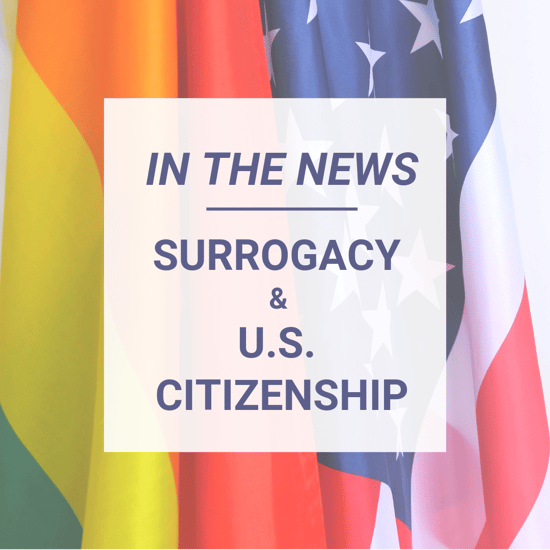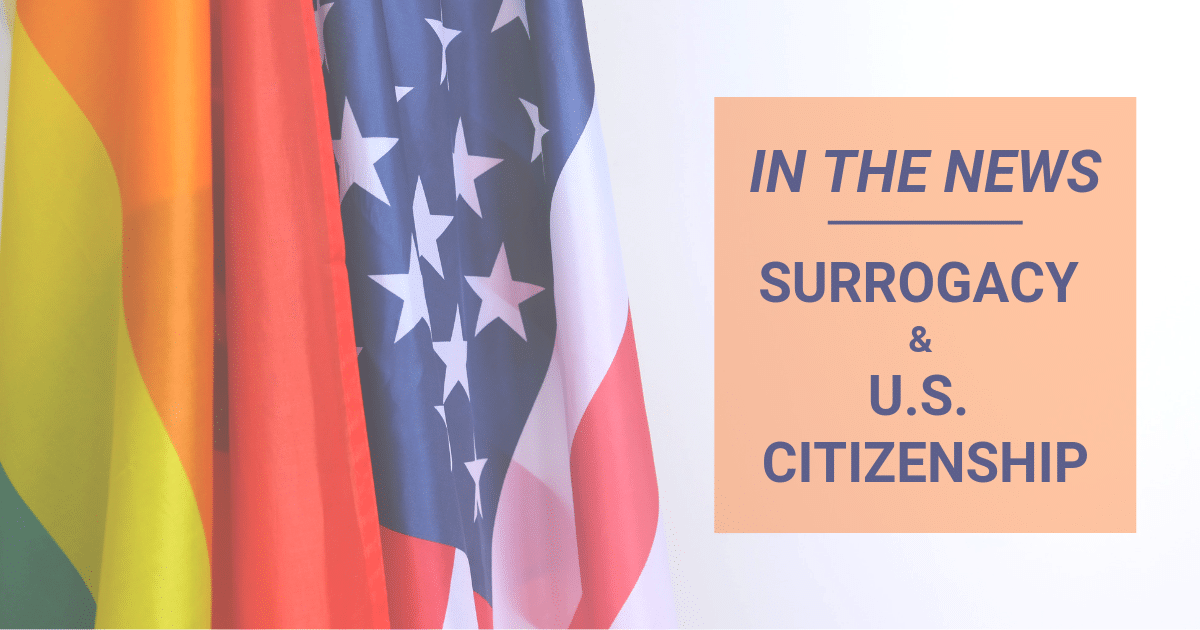IN THE NEWS | Surrogacy & Citizenship
June 5th, 2019 | 3 min. read

 U.S. intended parents interested in pursuing surrogacy overseas should proceed with caution. In several recent high-profile cases, the U.S. government has denied birthright citizenship to children born overseas to same-sex married couples.
U.S. intended parents interested in pursuing surrogacy overseas should proceed with caution. In several recent high-profile cases, the U.S. government has denied birthright citizenship to children born overseas to same-sex married couples.
In all three instances, the children have been treated differently from siblings either born earlier or that share biological ties to their U.S. citizen parents. These issues are a result of the application of decades old policies that have failed to keep up with the advancements in Assisted Reproduction Technology (ART) and the Trump Administration’s current view that any child born to a gestational surrogate is to be treated as a child out of wedlock for citizenship purposes.
LEGAL PRECEDENTS FOR SURROGACY
Historically, the Department of State required a U.S. citizen parent to have a genetic relationship to a child for the purpose of automatically transmitting the parent’s citizenship to a child born abroad. In 2014, the Department of State interpreted the definition of child to include the child of a gestational mother even where there is no genetic relationship between the child and gestational mother. The expanded definition of child under the Immigration and Nationality Act (“INA”), 8 U.S.C. § 1401, when addressing the transmission of citizenship at birth to a child born abroad was a welcome change. However, due to rapid advances in ART, gaps continue to exist in State’s legal interpretation of “child” for the purposes of transmitting citizenship to children of U.S. citizens conceived through ART and born abroad, leaving some children stateless. The State’s current requirement that parents share a genetic or gestational connection with a child in order for the child to receive the benefit of a parent’s U.S. citizenship unnecessarily limits, and introduces confusion to, modern family arrangements achievable through ART.
CITIZENSHIP COMPLICATIONS
Further, the current State Department stance that any child born to a gestational surrogate shall be considered a child born out of wedlock has had dire results for same sex couples where both dads are actual US citizens. Children born out of wedlock face higher legal and logistical hurdles to obtaining birthright citizenship. U.S. Citizen parents must: 1. submit to DNA tests proving genetic links to child; 2. prove and testify that they can support their children financially; and 3. prove that they have been present in the United States for at least five years prior to the child’s birth.
NEXT STEPS FOR PARENTS TO BE
Currently the American Bar Association and others in the ART industry are lobbying the Department of State to interpret the INA to recognize intended parents as legal parents even without a genetic or gestational relationship to the child, and to recognize children born to parents who are legally bound by marriage or civil union as not “born out of wedlock.” Until the rules are changed, however, there are no short cuts or easy fixes. In order to be safe and ensure that their children will be U.S. citizens, U.S. intended parents should pursue surrogacy in the United States.

 This post was written by Natalie Kanellis, Senior Counsel at Circle Surrogacy, LLC and Weltman Law Group and Dean Hutchison, V.P. of Legal Services at Circle Surrogacy and Weltman Law Group.
This post was written by Natalie Kanellis, Senior Counsel at Circle Surrogacy, LLC and Weltman Law Group and Dean Hutchison, V.P. of Legal Services at Circle Surrogacy and Weltman Law Group.
